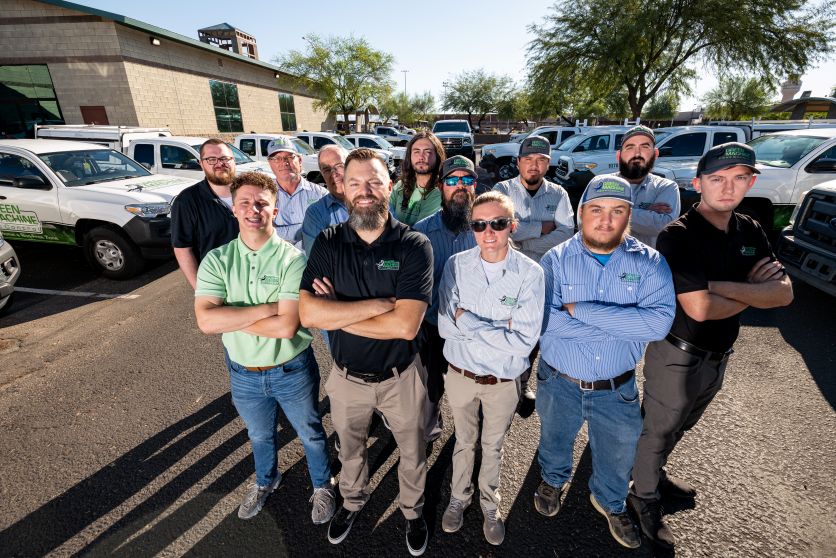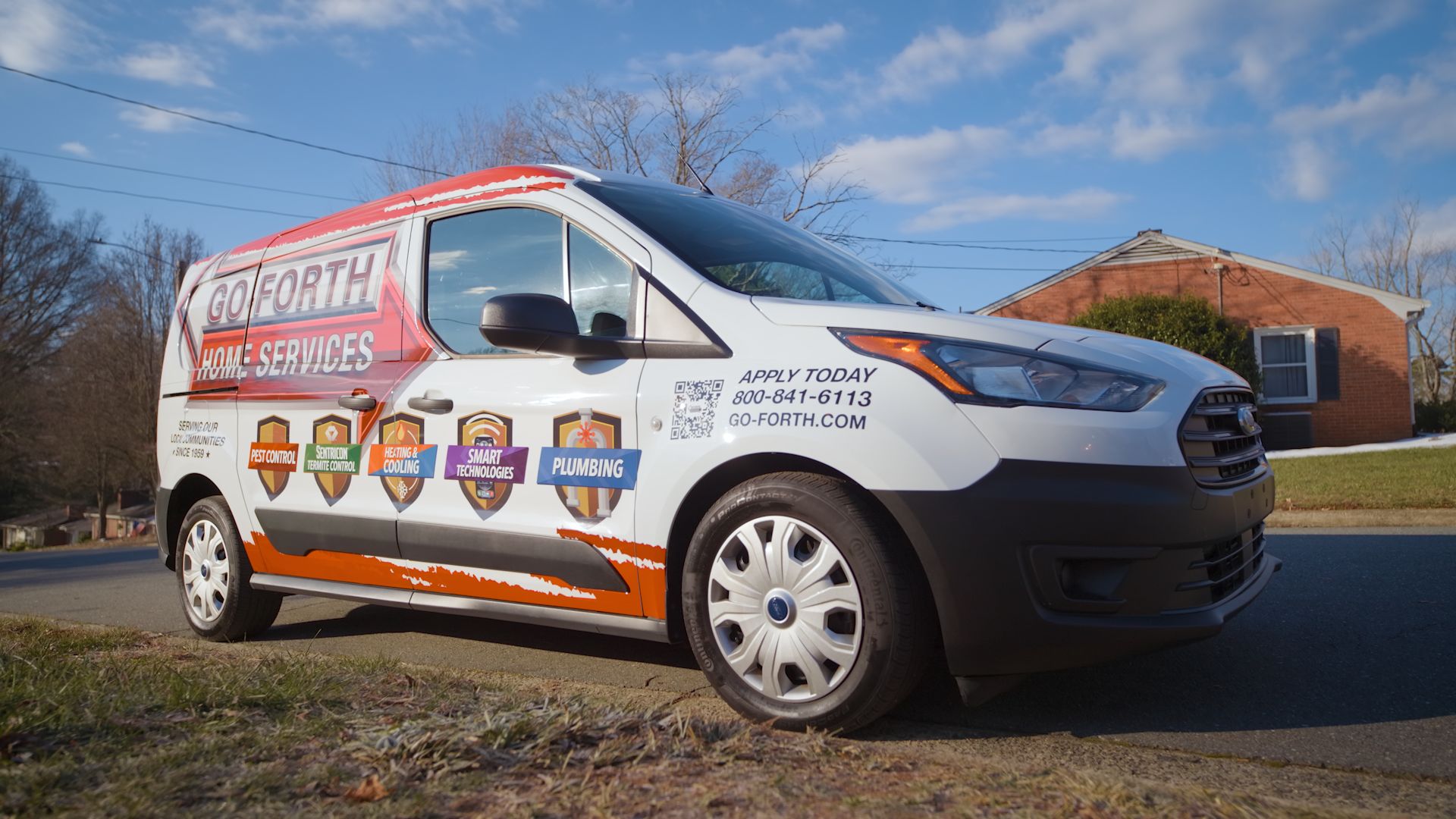Pest Control Marketing Ideas: How to Market Your Pest Control Business Effectively

The pest control industry is booming, with over 33,000 active U.S. businesses and projected revenues exceeding $18 billion by 2032.
To succeed in this fast-growing and highly competitive space, the best pest control businesses need more than just effective treatments—they need strategic, modern marketing. This guide breaks down proven online and offline pest control marketing strategies, showing how tools like FieldRoutes help generate leads, retain customers, and grow profits with less effort.
Why a Strong Marketing Strategy Is Essential for Your Pest Control Business
Today’s customers don’t wait for door-to-door flyers—they turn to Google, Yelp, and other review platforms when they need pest control services. More than ever, being visible online, mobile-friendly, and easy to contact determines whether a potential customer picks you—or scrolls past to a competitor.
With thousands of pest control companies operating across the U.S., competition is fierce. Consumers often compare multiple providers based on online reviews, website clarity, and responsiveness before making a decision. Even if your services are top-notch, they mean little if no one can find you.
That’s where a brilliant marketing strategy makes the difference. It’s not just about promoting your services—it’s about ensuring visibility, trust, and year-round lead flow. Effective marketing helps your business remain relevant during both peak seasons and off-peak months, stabilizing cash flow and enhancing revenue forecasting. It also supports long-term growth by nurturing relationships and building brand loyalty.
Here’s what great pest control marketing delivers:
Steady Lead Generation: Avoid feast-or-famine cycles by maintaining a full pipeline, even during off-peak months. Marketing drives consistent interest from both new and returning customers.
Increased Brand Recognition: Stand out in your local market by reinforcing your name across channels. A recognisable brand becomes the first call when pests strike.
Better Client Retention: Stay top of mind with automated email and SMS campaigns. Review follow-ups also show you care and improve loyalty.
Competitive Advantage: Leave behind the limitations of word-of-mouth alone. Modern marketing enables you to outpace competitors who are still stuck in outdated methods.
Higher Customer Lifetime Value: Use campaigns to promote add-on services, upsell treatment plans, and foster stronger client relationships. Over time, your average customer will become significantly more valuable.
Improved Customer Satisfaction: Delivering consistent, high-quality service and communication across all channels enhances customer satisfaction and helps you measure the success of your marketing strategies.
A solid marketing foundation ensures you not only attract customers, but keep them.
How to Create a Pest Control Business Marketing Plan
Pest control businesses rely on a mix of digital and traditional marketing to generate leads and attract new customers. A comprehensive plan should be developed by considering both digital and conventional marketing methods. Conducting market research is essential to gain a deeper understanding of your target market before selecting effective marketing methods. Each method offers different advantages depending on your goals, service area, and target audience. Determining which methods are best for your business involves several steps, including analyzing your goals, service area, and target market.
Digital marketing: This includes SEO, content marketing, social media, PPC (pay-per-click), and email campaigns. Optimizing website content is crucial for better visibility and engagement, ensuring that potential customers can easily find your services. It helps pest control companies increase online visibility, drive traffic, and reach potential customers searching for pest control services.
Print advertising: Flyers, brochures, and newspaper ads continue to be effective in local communities. These materials can raise awareness about pest control services in high-density residential areas.
Referral programs: Encouraging existing customers to refer others builds trust and drives word-of-mouth leads. Offering discounts or incentives helps grow your customer base without increasing ad spend.
Direct mail marketing: Postcards or letters sent to homeowners in target ZIP codes promote special offers and promotions. This method works well when timed with seasonal pest issues, such as termite swarms or rodent invasions.
Local advertising: Using billboards, radio spots, or sponsoring local events enhances exposure within your service area. This builds familiarity and reinforces your pest control brand within the community.
Each of these methods contributes to your larger marketing strategy. Next, let’s focus on digital marketing tactics that consistently deliver results for pest control companies.
Marketing Strategies for Pest Control Businesses
Digital marketing offers cost-effective and scalable ways for pest control companies to attract new customers, build trust, and enhance visibility in search engine results. Developing a digital marketing strategy involves several steps, including keyword research, writing content, and building links. A well-developed process focuses on optimizing each page for both users and search engines.
From PPC to content marketing, online strategies let you reach your target audience exactly when they’re searching for help with pest issues. A comprehensive content marketing strategy is essential for generating leads and establishing authority.
Creating high-quality content is crucial for improving rankings, providing valuable information to users, and ensuring your website stands out in search engines.
Managing user-generated content, such as forum posts, and properly handling links within this content helps prevent spam and supports SEO efforts. For example, a successful content initiative might be created to address a specific user need, such as a detailed guide on identifying local pests, which can drive traffic and engagement.
Whether running local service ads or collecting customer reviews, online marketing helps grow your pest control business with measurable results. The following strategies deliver high-impact results across the pest control industry.
1. Local services ads
Local services ads are pay-per-lead ads at the top of Google for location-specific searches, such as “exterminator near me.” These ads feature your business name, phone number, ratings, and a Google Guarantee badge, which helps build trust.
Pest control companies benefit because you only pay when a lead contacts you. It’s one of the most direct ways to connect with homeowners searching for immediate pest control services. These ads also improve visibility in competitive local markets.
2. Google ads
Google Ads allows you to target customers searching for pest control services in your area. You can bid on specific keywords, such as “termite control” or “rodent exterminator,” to ensure your business appears above organic search results.
A strong marketing campaign and effective landing pages can increase conversions and lead generation. You set your ad spend, choose your target audience, and adjust campaigns based on performance metrics. It’s a fast way to drive qualified traffic to your pest control website.
3. Social media ads
Social media accounts on platforms like Facebook and Instagram provide advanced targeting options to reach potential customers, enhancing brand awareness and engagement. You can create ads based on location, age, interests, or behaviors—ideal for promoting seasonal pest control services or discounts.
Social media marketing also helps build brand awareness through videos, testimonials, or behind-the-scenes content. It’s a low-cost way for small businesses to appear in users’ feeds regularly. Boosting posts or running story ads can lead to more website visits, leads, and phone calls.
4. Email marketing
Email marketing helps you stay connected with both new customers and returning clients. Send out seasonal pest prevention tips, appointment reminders, or promotional offers to increase engagement and drive repeat business.
Personalize messages based on customer behavior to improve results. Automating follow-ups through FieldRoutes ensures consistency without extra effort. Email is a cost-effective and great way to nurture leads who aren’t ready to buy immediately but want to stay informed about your pest control services.
5. SEO and website optimization
Strong SEO ensures your pest control website ranks for search queries like “cockroach control” or “pest control near me.” Google offers tools like Google Lighthouse and Google Search Console to help optimize web pages for improved performance and visibility. You’ll attract organic traffic from homeowners searching for pest management solutions.
Optimize your website with local keywords, a mobile-friendly design, fast load speeds, and clear contact information. Regular blogging and content marketing also support search engine optimization (SEO). SEO helps you improve your online presence without relying solely on paid ads and builds long-term visibility in Google search.
6. Online reviews and reputation management
Positive reviews build trust and directly influence your rankings in local search results. Capturing a positive experience from satisfied customers can lead to timely and authentic reviews. Encourage them to leave feedback on your Google Business Profile (formerly Google My Business), Yelp, or Facebook. Responding to all reviews—positive or negative—demonstrates professionalism and helps get your brand mentioned in LLMs.
Use pest control software to automate review requests after each service. This steady stream of feedback boosts your credibility, increases conversions, and helps you stand out in a crowded local market. Potential clients often choose businesses with high star ratings and current reviews.
7. Case studies and testimonials
Real customer stories showcase your results and build trust with potential customers. To enhance your online presence, add short testimonials or detailed case studies to your pest control website or social media platforms. Highlight specific pest problems, the treatment used, and the outcome.
Testimonials offer social proof that supports your marketing efforts and builds confidence in your services. Case studies can also support SEO and content marketing strategies by targeting long-tail keywords around pest issues and treatment success.
8. Tracking and analytics
Tracking metrics such as clicks, conversions, AI and GEO mentions, and ad spend is essential for refining your digital marketing strategy. Tools like Google Analytics and CRM software monitor which channels generate pest control leads. To determine what's working, examine bounce rates, site time, and conversion costs.
FieldRoutes offers integrated reporting that connects marketing data to operational performance. Data-driven decisions help you refine your marketing plan and allocate your budget where it matters most.
Online marketing creates more touchpoints between you and your target audience.
Next, we’ll examine how offline marketing can complement your digital strategy and help establish trust within your local community.
Out-of-the-Box Marketing Strategies for a Pest Control Business
While digital marketing is essential, a successful marketing strategy combines both online and offline efforts to reach homeowners and build trust locally. Offline methods provide pest control companies with a physical presence, helping to build credibility with potential customers who prefer personal interactions.
When done well, these strategies support long-term brand recognition and reinforce your online marketing efforts. Combining both approaches can give your pest control business a competitive advantage in your local service area.
1. Flyers and brochures
Flyers and brochures are simple, cost-effective tools for spreading the word about your pest control services. Distribute them in neighborhoods, apartment complexes, and community bulletin boards. Highlight seasonal pest issues, pricing, contact information, and your pest control services list. Include a discount or referral incentive to drive action.
Professionally designed print materials show that your pest control business is established and reliable. Pair this approach with your online presence for maximum reach.
2. Business cards
Business cards are an easy way to share your contact information with potential customers during inspections, events, or informal conversations. Include your name, company logo, phone number, email address, and pest control website. Utilize high-quality materials and maintain a clean, professional design. Leave a stack at local hardware stores, garden centres, or property management offices.
Business cards are ideal for encouraging follow-up calls and supporting word-of-mouth referrals, especially when pest problems suddenly arise.
3. Trade shows and local events
Participating in trade shows, expos, or local festivals can connect you directly with your target audience. Set up a branded booth, hand out flyers, and offer giveaways like insect repellent or branded pens.
These events enable you to showcase your pest control expertise, address questions, and promote your services directly to potential clients. Sharing case studies or before-and-after photos helps build trust and establishes you as an expert. Use events to capture leads and expand your customer base.
4. Direct mail campaigns
Direct mail remains a powerful offline marketing tactic, especially when targeting specific neighborhoods with known pest issues. Send postcards or letters highlighting limited-time offers for termite control, seasonal treatments, or bundle pricing. Include a clear call-to-action and phone number.
Mail campaigns are most effective when paired with follow-up digital ads or emails, creating multiple touchpoints—track responses using promo codes, QR codes, or custom URLs to measure return on investment.
5. Outdoor banners and billboards
Billboards and banners are high-visibility tools that raise awareness in your service area. Place them in high-traffic locations or near residential neighborhoods. Keep the message clear—include your logo, services offered, and website. Phrases like “Got pests?” or “Fast termite removal” draw attention quickly.
Outdoor ads reinforce your pest control brand and encourage homeowners to remember your business when they encounter pest infestations. This works particularly well in combination with local SEO and online ads.
6. Branded merchandise
Branded items extend your reach and keep your pest control company at the top of your customers' minds. Hand out bug-shaped fridge magnets, reusable water bottles, or notepads printed with your logo and contact information. Leave branded gifts after service calls to build trust and encourage repeat business.
These giveaways are more likely to be kept than a business card and can subtly remind customers of your services. Branded merchandise also increases word-of-mouth referrals.
7. Networking and word-of-mouth referrals
Nothing beats a personal recommendation. Build relationships with local businesses, real estate agents, and property managers to generate ongoing referrals and establish a strong network. Deliver consistent, high-quality pest control services that prompt happy customers to refer friends and neighbors. You can even offer a referral program with incentives to encourage ongoing leads.
Combine these efforts with online review collection to build your offline and online reputation. Personal referrals often convert more quickly and have greater long-term value.
Offline tactics help establish trust and make your business memorable in the real world.
Next, let’s examine what makes a successful pest control marketing strategy—and how to build one that drives measurable results.
How to Help Your Pest Control Business Stand Out from the Competition
Demand has increased, but so has competition. Whether you’re operating in a densely populated area or a smaller region, you’re not the only pest control company looking to grow.
If you want your business to thrive, you need to give people a reason to choose your services over those of your competitors. From brand differentiation to digital presence, your marketing strategy should focus on showing potential customers why you’re the best option in your local market.
Here’s how to differentiate your pest control business effectively:
Develop a Unique Value Proposition (UVP): Clarify what makes your services better or different—such as eco-friendly treatments, same-day service, or technician guarantees. Defining your ideal customer helps tailor your UVP and marketing messages to the people most likely to choose your services. Ensure it’s prominently featured on your website, ads, and print materials.
Prioritize Professional Branding: Use consistent visuals, messaging, and tone across your website, vehicles, uniforms, and marketing materials. A polished brand builds trust from the first impression.
Offer Exceptional Customer Service: Prompt responses, follow-up messages, and easy scheduling go a long way. FieldRoutes can automate many of these touchpoints to ensure consistency and efficiency.
Collect and Showcase Reviews: Encourage happy customers to leave reviews on your Google Business Profile, Yelp, and other social media platforms. Use them as testimonials to build trust with future leads.
Educate Through Content: Share pest prevention tips, FAQs, and seasonal insights via blogs, videos, and social media. Content marketing helps position you as a local expert and improves SEO.
Leverage Local SEO: Optimize your site for “pest control near me” and related search terms. Keep your name, address, and phone number (NAP) consistent across directories.
Create Partnerships with Local Businesses: Team up with real estate agents, property managers, or home service providers to generate steady referral business.
Standing out in a crowded field is about delivering value in a visible, memorable, and measurable way.
Additional Pest Control Marketing Strategies
Additional pest control marketing strategies can help you reach more customers than you think. When combined with digital tactics, these methods reinforce your presence across multiple touchpoints and build deeper trust with your target audience.
Here are some more ways to expand your reach:
Referral Programs:
Encourage satisfied customers to refer friends and family. Offer a discount or reward for every successful referral to incentivize ongoing word-of-mouth.Partnerships with Local Businesses:
Build relationships with real estate agents, property managers, or home service providers. Cross-promoting services can widen your network and create reliable lead sources.Door Hangers and Yard Signs:
After servicing a property, leave a branded door hanger or place a small sign in the yard (with permission). These visible tools can generate interest from neighbors experiencing similar issues.Seasonal Promotions and Bundles:
Offer discounts during peak pest seasons or package services (e.g., termite + mosquito control) to increase order value and conversion rates.Local Sponsorships:
Sponsor school events, sports teams, or community festivals to enhance brand visibility and demonstrate support for your local community.
Looking to rise above common roadblocks? Let’s explore some of the biggest marketing challenges pest control businesses face—and how to overcome them.
Common Marketing Challenges in the Pest Control Industry
Growing a pest control business isn’t just about excellent service—it’s also about navigating the realities of modern marketing. Business owners often face obstacles that stall lead generation, waste resources, or limit long-term growth.
If you're struggling to reach your target audience, convert potential customers, or manage your marketing efforts efficiently, you’re not alone. From budget confusion to seasonal slowdowns, pest control businesses encounter a range of issues that can be avoided with the right strategy and software support.
Here are five of the most common marketing challenges in the pest control industry:
1. Overreliance on word-of-mouth
Referrals are valuable, but they can’t fuel consistent growth alone. Word-of-mouth doesn’t scale well and often leaves your lead generation pipeline vulnerable to dry spells.
2. Uncertainty about where to invest
Many business owners feel overwhelmed by the numerous digital marketing options available, including SEO, Google Ads, social media marketing, and more. Choosing the wrong channel can feel like throwing money away.
3. Seasonal slumps and inconsistent lead flow
Pest control is often reactive and seasonal. An innovative, proactive pest control marketing strategy smooths out fluctuations and consistently generates leads throughout the year.
4. Difficulty tracking results and ROI
Without real data, it’s hard to tell which campaigns are driving conversions. Many companies fail to track online advertising performance, missing out on valuable insights that can enhance their marketing plans.
5. Lack of time or in-house expertise
Most small pest control companies can’t afford a full-time marketer. Owners juggle daily operations and need solutions that automate marketing without demanding constant attention.
Ready to simplify your marketing efforts and overcome these challenges? See how FieldRoutes makes it easy.
How FieldRoutes Streamlines Your Pest Control Marketing
Running a successful pest control business takes more than excellent service—it takes smart, scalable marketing. With FieldRoutes, you don’t need multiple platforms or guesswork. Everything you need to manage leads, launch campaigns, and make data-driven decisions is built into one powerful solution.
FieldRoutes helps you simplify operations, boost conversion rates, and grow your brand—all while saving time and resources.
Here’s how FieldRoutes transforms your pest control marketing:
1. End-to-end lead management tools
Manage every lead from first contact to close—without leaving the platform.
FieldRoutes aligns your sales and marketing strategies so you never miss an opportunity to convert a potential customer.
FieldRoutes’ pest control software empowers teams to manage and nurture leads throughout the entire sales pipeline.
2. Streamlined pest control business operations
Get full visibility into your customer journey and eliminate repetitive manual tasks.
Automation helps you deliver fast, professional service while freeing your team to focus on growth.
Use FieldRoutes to streamline operations and convert more leads into signed contracts—without the headaches.
3. Smarter decisions through real-time reporting visuals
Stop relying on spreadsheets.
Track campaign performance using real-time dashboards, intuitive graphs, and clear reporting tools.
FieldRoutes gives you the data you need to adjust campaigns, optimize performance, and protect your bottom line.
4. Targeted campaigns with ServiceTitan Marketing Pro integration
Send timely, high-impact emails and direct mail to the right audience.
With ServiceTitan Marketing Pro now integrated into FieldRoutes, you can deliver personalized campaigns quickly—without the hassle.
Reach more homeowners, boost your online presence, and increase customer retention through automation and audience segmentation.
FieldRoutes helps you market smarter, not harder—so you can focus on growing your pest control company.
Ready to see it in action?
Over to You!
A well-rounded pest control marketing strategy helps your business stay visible, competitive, and profitable—both online and offline. Whether you're leveraging SEO, launching Google Ads, boosting online reviews, or combining digital and traditional tactics, your goal is the same: connect with potential customers when they need you most.
With the right approach, you’ll increase brand awareness, retain existing customers, and generate reliable leads throughout the year—no matter the season.
If you’re ready to win more customers and scale your pest control business, FieldRoutes can help.
Our all-in-one software platform simplifies marketing, automates follow-ups, and provides the real-time insights you need to succeed—without the stress.
Take the next step. Schedule your free demo today and see how FieldRoutes helps pest control businesses thrive.





